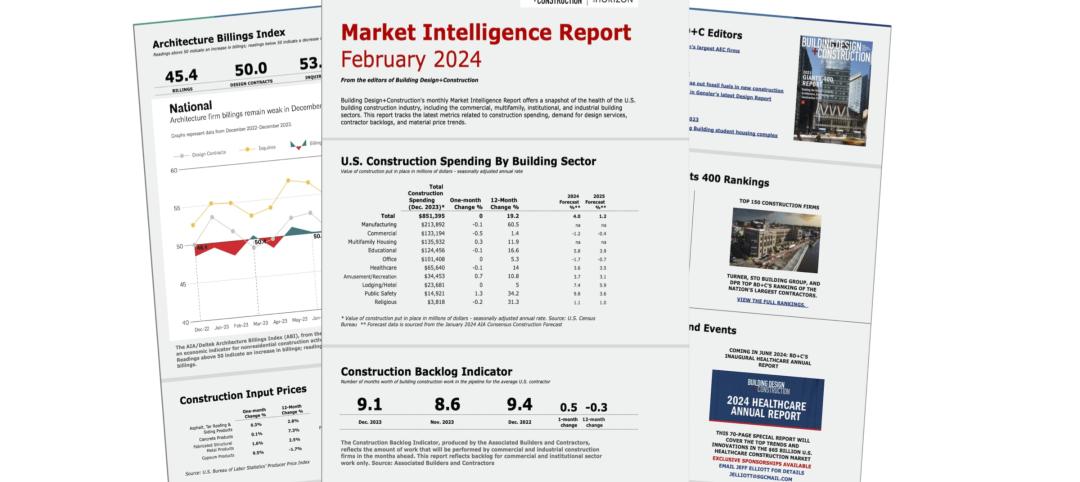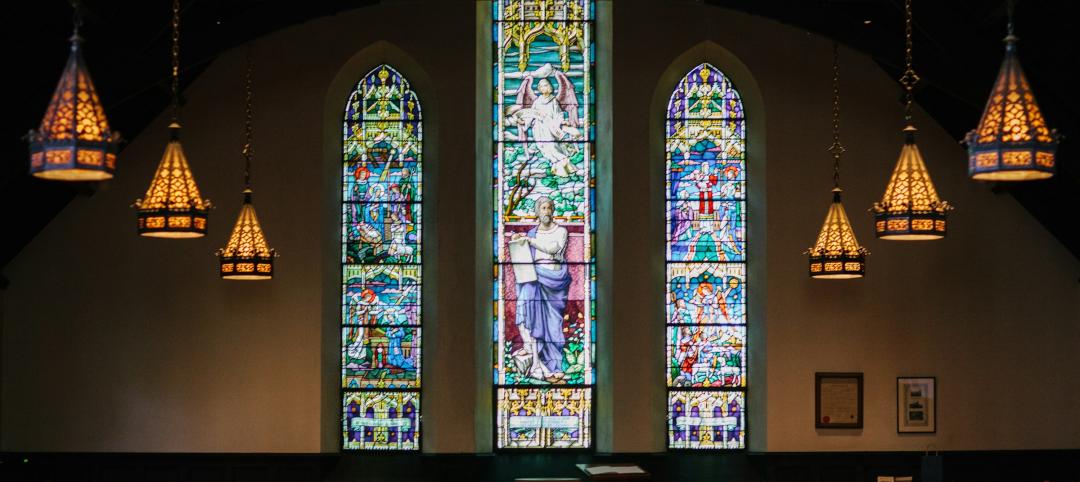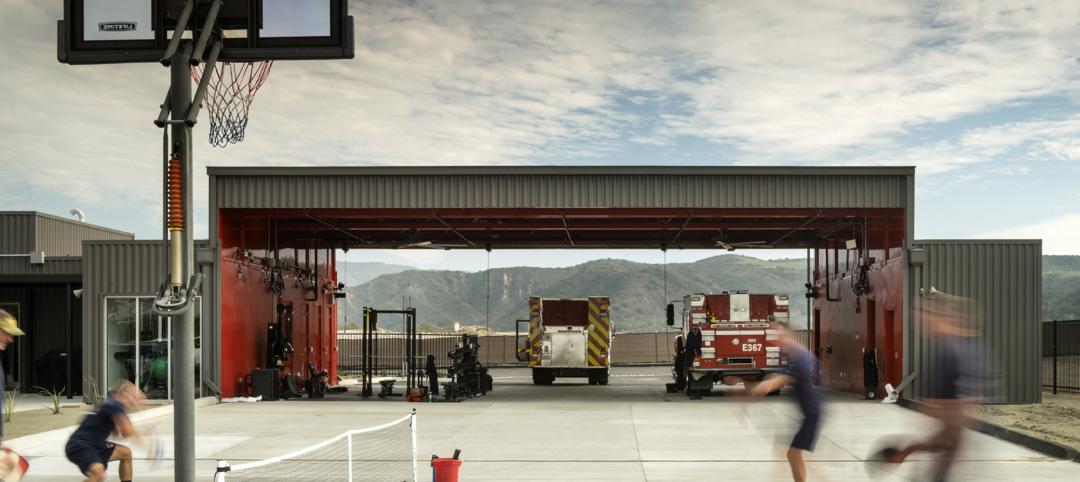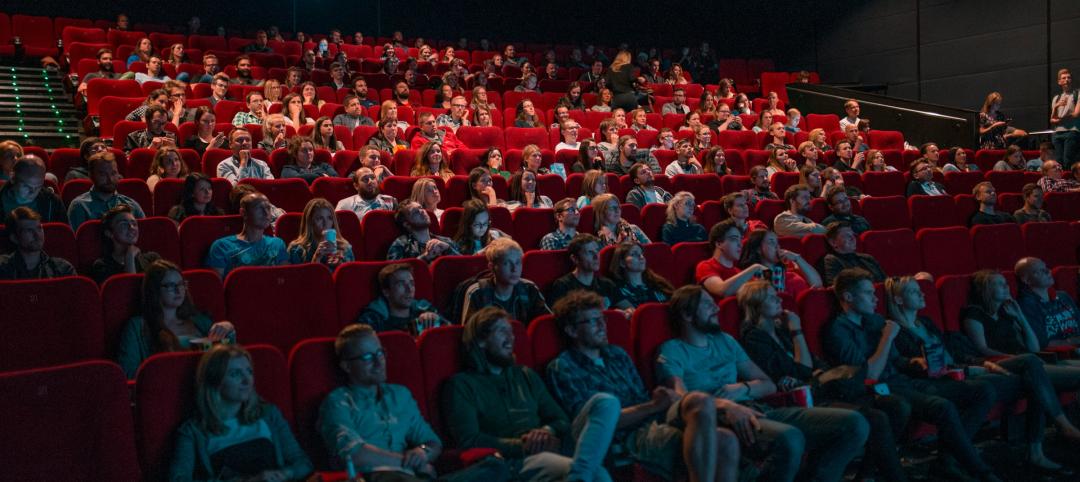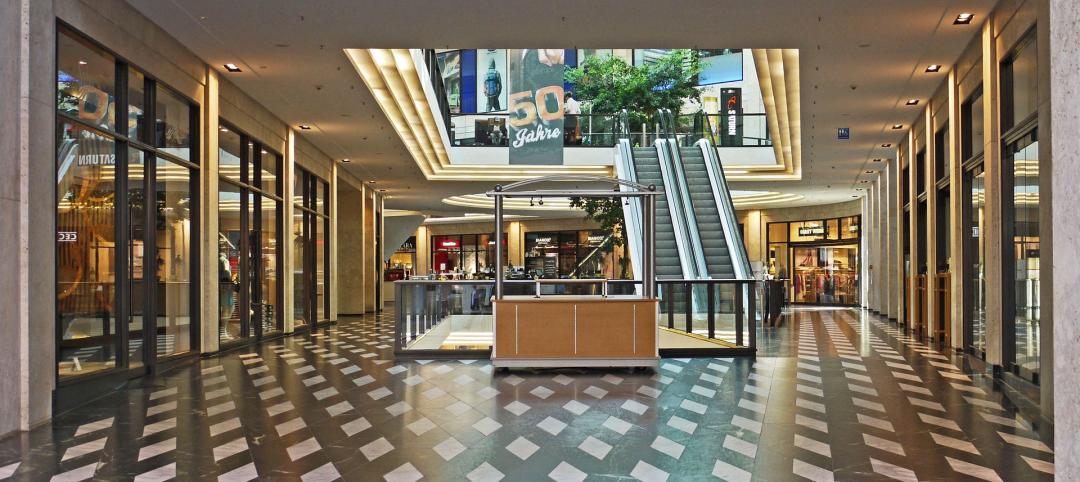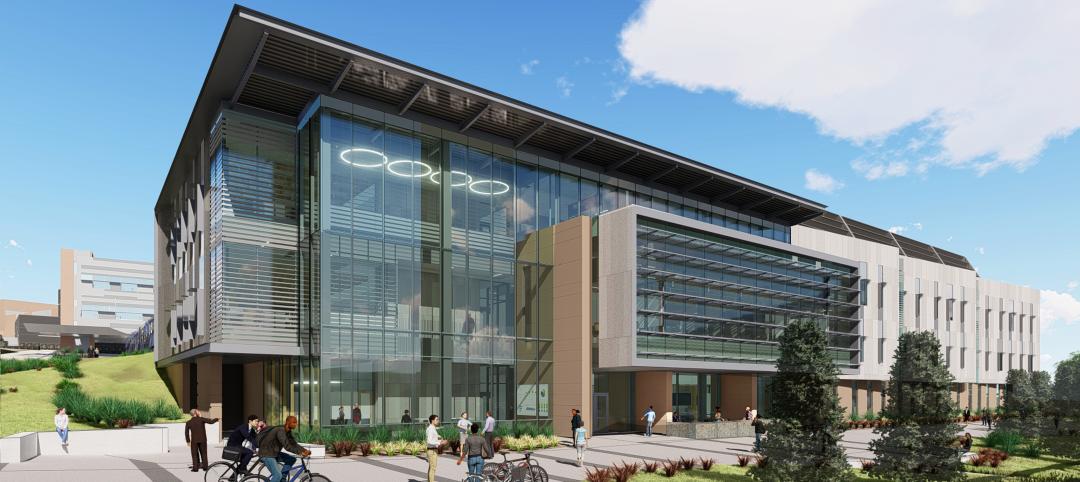DCI Artform, a global retail marketing agency based in Milwaukee, Wis., wanted a presence in a bigger city to attract talent and improve its accessibility for international customers.
TOP 100 OFFICE ARCHITECTURE FIRMS
Rank, Firm, 2015 Revenue
1. Gensler $593,420,000
2. HOK $138,657,000
3. Perkins+Will $118,380,000
4. Stantec $94,328,923
5. Skidmore, Owings & Merrill $75,673,007
6. Nelson Worldwide Holdings $66,167,382
7. ZGF Architects $58,827,045
8. CallisonRTKL $54,320,000
9. HGA $50,310,000
10. SmithGroupJJR $47,013,000
TOP 100 OFFICE CONSTRUCTION FIRMS
Rank, Firm, 2015 Revenue
1. Turner Construction Co. $2,507,876,248
2. Structure Tone $1,939,270,000
3. Gilbane Building Co. $1,457,237,000
4 .Balfour Beatty US $1,293,034,101
5. Holder Construction Co. $1,018,000,000
6. Skanska USA $848,654,281
7. PCL Construction Enterprises $814,339,952
8. AECOM $795,790,000
9. Clayco $702,000,000
10. BL Harbert International $673,085,875
TOP 70 OFFICE ENGINEERING FIRMS
Rank, Firm, 2015 Revenue
1. Jacobs $438,700,000
2. AECOM $285,000,000
3. Thornton Tomasetti $108,284,346
4. WSP | Parsons Brinckerhoff $93,672,000
5. Burns & McDonnell $59,216,746
6. Arup $55,609,224
7. Syska Hennessy Group $35,568,928
8. Dewberry $29,285,538
9. Hankins and Anderson $25,877,629
10. Benham Design $18,638,864
Last year, DCI opened a satellite office in downtown Chicago’s Illinois Center. The 8,000-sf space includes a creative design studio and “digital cave,” a virtual environment that uses high-resolution laser and stereoscopic projection and 3D computer graphics to present clients with options for product displays and branding.
“DCI is into retail theory and the science of what goes where to stimulate sales,” says Robert Benson, Principal with CannonDesign, which provided architectural, MEP, and audiovisual services to DCI. “The digital cave can show clients what customers recognize at 40 feet, 10 feet, and within touching distance.” DCI Artform is doubling its space in the building.
Technology is redefining how offices function. A recent Adobe survey of 1,003 office workers across the U.S. found that 81% think state-of-the-art technology is more important to where they work than other perks or amenities. Office design is evolving to where “it’s now about how people work with technology,” says Glenn Leitch, AIA, LEED AP, Director of Design, Highland Associates.
Marc Margulies, AIA, Principal/Owner, Margulies Peruzzi Architects, Boston, says offices still have three primary functions: to inspire productivity, attract and retain talent, and enhance the company’s brand. Technology is now essential for worker collaboration and mobility, and is affecting office design in every conceivable way, he says.
Susan Kohuth, ASID, NCIDQ, LEED AP, Principal of OZ Architecture’s Interior Design Workplace in Denver, points to Trimble’s 125,000-sf office in Westminster, Colo. OZ designed part of the rooftop for an R&D lab with an array of antennae that Trimble uses to test its GPS technology.
Technology is particularly salient to the growing trend of “hoteling” (where mobile employees schedule time and space in their offices) and “hot seating” or “free addressing” (where employees sit at whatever workstations happen to be available).
Stantec is engaged in a pilot program for Grant Thornton, testing hot seating in a 20,000-sf space in McLean, Va., to see if it “fits culturally,” says Stantec Principal Angie Lee, FAIA, IIDA, LEED BD+C.
Since 2015, Arcadis has converted 12 of its offices to 100% unassigned workstations, with four more in progress. The firm has cut office space needs by 30–50%. “We’re seeing momentum toward activity-based work, untethering employees from their desks,” says Jodi Williams, AICP, LEED AP ID+C, Senior Workplace Strategist for CallisonRTKL, an Arcadis company.
Perceptions about office design and functionality are being questioned, especially concerning employee work patterns.
The paucity of conference rooms is a common complaint in many offices. Before VOA Associates (now part of Stantec) started on a new 156,000-sf office for Grant Thornton in Chicago, it sent in a team to observe worker movement in the client’s other offices. VOA found that 60% of conference rooms were empty most of the time. They were either poorly located, too small, or had insufficient A/V support, 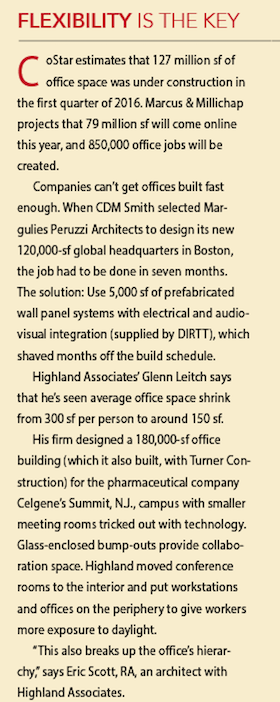 says Lee.
says Lee.
VOA designed Grant Thornton’s new office with a mix of variously sized offices, meeting rooms, and “huddle rooms,” where workers can plug in their mobile devices and share information on high-def screens mounted on the wall.
More companies are switching to standup desks, theoretically for health reasons. But Williams says she’s hearing from some clients that standup desks aren’t getting as much use as expected. Arcadis itself is moving toward 20% adjustable-height desks, she says.
There’s also a sense that office workers are more likely to accept change when they have input into the design and planning of workspaces.
SRAM, which makes bicycle parts, planned its new corporate headquarters as a space that “reinforced its culture,” says Fred Schmidt, IIDA, LEED AP, Interior Design Global Leader, Perkins + Will, Chicago.
P+W interviewed SRAM staff in each of the company’s departments. Employees were given the opportunity to comment on furniture mockups from three suppliers. SRAM conducted an internal contest where employees could design the bike racks for their workstations.
SRAM’s 72,000-sf headquarters, in a former meat-storage building on Fulton Street in Chicago, has space for advanced product development, a full machine shop, workbenches, a test track, and a kitchen and café that opens onto a terrace.
“Millennials are on to something when they talk about work-life environments,” says P+W’s Schmidt.
RETURN TO THE GIANTS 300 LANDING PAGE
Related Stories
Market Data | Feb 7, 2024
New download: BD+C's February 2024 Market Intelligence Report
Building Design+Construction's monthly Market Intelligence Report offers a snapshot of the health of the U.S. building construction industry, including the commercial, multifamily, institutional, and industrial building sectors. This report tracks the latest metrics related to construction spending, demand for design services, contractor backlogs, and material price trends.
Giants 400 | Feb 6, 2024
Top 80 Religious Facility Architecture Firms for 2023
Parkhill, FGM Architects, GFF, Gensler, and HOK top BD+C's ranking of the nation's largest religious facility architecture and architecture engineering (AE) firms for 2023, as reported in the 2023 Giants 400 Report.
Modular Building | Feb 6, 2024
Modular fire station allows for possible future reconfigurations
A fire station in Southern California leveraged prefab, modular construction for faster completion and future reconfiguration.
Giants 400 | Feb 5, 2024
Top 30 Entertainment Center, Cineplex, and Theme Park Architecture Firms for 2023
Gensler, JLL, Nelson Worldwide, AO, and Stantec top BD+C's ranking of the nation's largest entertainment center, cineplex, and theme park architecture and architecture engineering (AE) firms for 2023, as reported in the 2023 Giants 400 Report.
Urban Planning | Feb 5, 2024
Lessons learned from 70 years of building cities
As Sasaki looks back on 70 years of practice, we’re also looking to the future of cities. While we can’t predict what will be, we do know the needs of cities are as diverse as their scale, climate, economy, governance, and culture.
Giants 400 | Feb 5, 2024
Top 90 Shopping Mall, Big Box Store, and Strip Center Architecture Firms for 2023
Gensler, Arcadis North America, Core States Group, WD Partners, and MBH Architects top BD+C's ranking of the nation's largest shopping mall, big box store, and strip center architecture and architecture engineering (AE) firms for 2023, as reported in the 2023 Giants 400 Report.
Laboratories | Feb 5, 2024
DOE selects design-build team for laboratory focused on clean energy innovation
JE Dunn Construction and SmithGroup will construct the 127,000-sf Energy Materials and Processing at Scale (EMAPS) clean energy laboratory in Colorado to create a direct path from lab-scale innovations to pilot-scale production.
Architects | Feb 2, 2024
SRG Partnership joins CannonDesign to form 1,300-person design giant across 18 offices
SRG Partnership, a dynamic architecture, interiors and planning firm with studios in Portland, Oregon, and Seattle, Washington, has joined CannonDesign. This merger represents not only a fusion of businesses but a powerhouse union of two firms committed to making a profound difference through design.
Giants 400 | Feb 1, 2024
Top 90 Restaurant Architecture Firms for 2023
Chipman Design Architecture, WD Partners, Greenberg Farrow, GPD Group, and Core States Group top BD+C's ranking of the nation's largest restaurant architecture and architecture engineering (AE) firms for 2023, as reported in the 2023 Giants 400 Report.
Standards | Feb 1, 2024
Prioritizing water quality with the WELL Building Standard
In this edition of Building WELLness, DC WELL Accredited Professionals Hannah Arthur and Alex Kircher highlight an important item of the WELL Building Standard: water.



